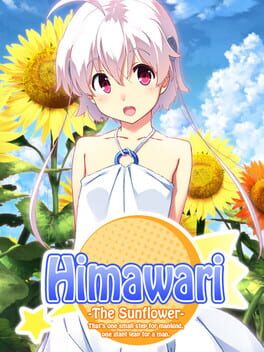

After jointly founding the so-called Space Club, Youichi and his friend Amamiya Ginga, the son of Amamiya Daigo, spent their school days building a rocket -- until one fateful night, a mysterious young girl called Aries crash-lands near them, her memories also lost from the shock of the landing.
Reviews View More
Himawari’s most pressing issue is that it tries to be a story oriented visual novel while being a character driven novel. I heard many referring to the huge plot twists ending every route, especially after the epilogue for the last one, yet I feel each and every one of them fell flat for the simple reason that I had been given not enough knowledge or reason to care about the mechanics behind the world, as the plot mostly focused on characters’ interactions, which aren’t that impressive too.
Each route, except maybe 2048, focused heavily on slices of life, mundane and every day content with sparse dramatic revelations and climaxes, so I was involved with the characters, I could relate to them (especially Akira, he’s my man) but as for the events I couldn’t care less or, in some cases, understand their importance. I was presented with a cast of characters having a simple, initial objective, to send a homemade rocket to fly into space, and from there it develops into a complex tale regarding the ambitions, the motives and, sometimes, the madness of the men reaching for the stars. What already made my emotional involvement with the story collapse were the inevitable comparison I unconsciously made with a comic named Planetes, which dealt with basically everything that is in Himawari only in far more depth, with better characters, a shorter more cohesive story and general better writing. I won’t make any distinct parallel between the two since it would be unfair and not say much about Himawari’s own merits. As for one last, personal digression, I hated the character of Daigo, from beginning to finish I couldn’t fathom his personality, his goals, his involvement with the story, everything he meant, did and stood for. Those who already read the novel may imagine how my impression of the story and the characters related to him was undermined by this, I won’t deny that what are often times considered to be the best parts of the game were, in fact, what had me the most groaning and rolling back my eyes for this reason.
Lastly, what hammered the remaining nails in the coffin, was the lack of an aftermath in every, single route. They just end, show you some plot twists, build a circumstantial resolution but leave so much open you’d just hope the next route had the answer you sought. They don’t, never. If you have questions in the middle of the game better forget them and hope it’s something the game thinks is deserving of an explanation before the ending. Regardless, oftentimes the more you will go on with the story the bigger will be the twists presented and the more the lack of any epilogue, explanation or context will leave you with just the build up for a grander sci-fi story that is never going to be told.
Each route, except maybe 2048, focused heavily on slices of life, mundane and every day content with sparse dramatic revelations and climaxes, so I was involved with the characters, I could relate to them (especially Akira, he’s my man) but as for the events I couldn’t care less or, in some cases, understand their importance. I was presented with a cast of characters having a simple, initial objective, to send a homemade rocket to fly into space, and from there it develops into a complex tale regarding the ambitions, the motives and, sometimes, the madness of the men reaching for the stars. What already made my emotional involvement with the story collapse were the inevitable comparison I unconsciously made with a comic named Planetes, which dealt with basically everything that is in Himawari only in far more depth, with better characters, a shorter more cohesive story and general better writing. I won’t make any distinct parallel between the two since it would be unfair and not say much about Himawari’s own merits. As for one last, personal digression, I hated the character of Daigo, from beginning to finish I couldn’t fathom his personality, his goals, his involvement with the story, everything he meant, did and stood for. Those who already read the novel may imagine how my impression of the story and the characters related to him was undermined by this, I won’t deny that what are often times considered to be the best parts of the game were, in fact, what had me the most groaning and rolling back my eyes for this reason.
Lastly, what hammered the remaining nails in the coffin, was the lack of an aftermath in every, single route. They just end, show you some plot twists, build a circumstantial resolution but leave so much open you’d just hope the next route had the answer you sought. They don’t, never. If you have questions in the middle of the game better forget them and hope it’s something the game thinks is deserving of an explanation before the ending. Regardless, oftentimes the more you will go on with the story the bigger will be the twists presented and the more the lack of any epilogue, explanation or context will leave you with just the build up for a grander sci-fi story that is never going to be told.
